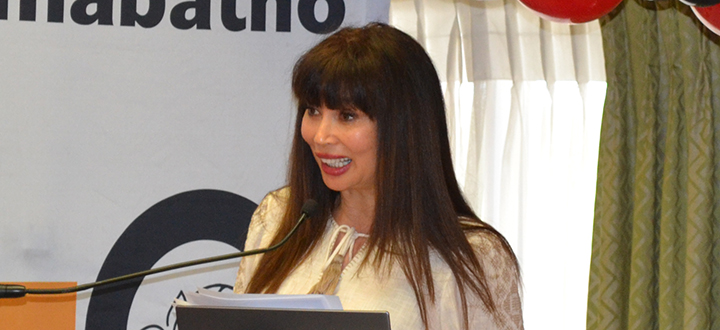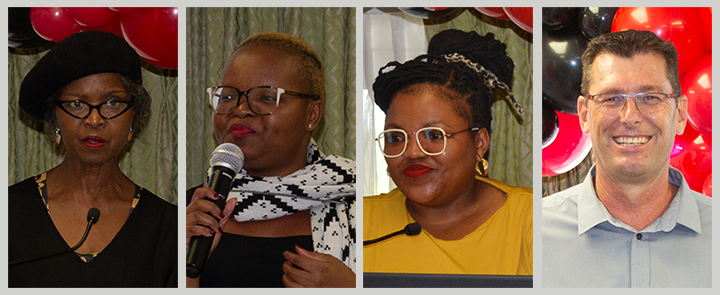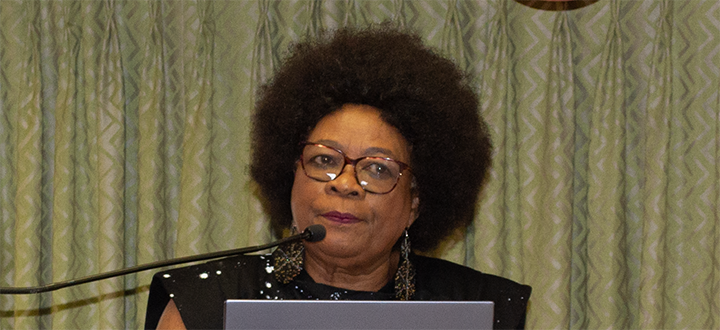News & Events
Veteran actress and cancer survivor advocates for self-screening and proactive health approach
On 21 February 2025, the Human Resources Department’s Employee Relations and Wellness Directorate hosted its 2025 Reproductive Health Month Commemorative event themed Navigating the journey towards beating cancer, the story of Dr Lilian Dube. Dube, a highly decorated and venerated South African actress, who survived breast cancer twice, shared her personal journey towards beating cancer and navigating the emotional trauma it brought her and her family, while inspiring others to take a proactive approach towards health screenings.
In her welcome address, Dr Gwendoline van der Berg, Manager: Human Resources Development, welcomed the guests comprised of staff, students, clinicians and member from various health bodies, including Sharmain Johnson, senior professional nurse from Higher Health.

Dr Gwendoline van der Berg, Manager: Human Resources Development
Van der Berg said that the event serves as a conversation-starter amidst the stigma surrounding health screenings for cancer and other multiple health issues for both men and women, particularly reproductive health, “because reproduction health is the cornerstone of our overall wellbeing, and therefore, this necessitates that we foster an environment where respectful and open discussion can take place.”
Higher Health supporting higher education students
In her presentation, Johnson explained the impact of Higher Health – a highly distinguished organisation specialising in providing health, wellness, psychological services and overall healthcare provision through establishing clinics at higher education institutions across the country. She said that at the primary level, Higher Health focuses on knowledge transfer through a peer education programme. “We educate students on different topics ranging from HIV/AIDS, STIs, alcohol and drug abuse, gender diversity, mental health and sexual reproductive health, among others,” she said.

From left: Vicky Malefo, Health and Wellness Manager, HIV/AIDS Division, Prof Fundiswa Kobo, Senior Lecturer: College of Human Sciences, Sharmain Johnson, Senior Professional Nurse: Higher Health, and Bertus Albrecht, Acting Director: Employee Relations and Wellness Directorate
She continued: “At the secondary level, we engage in practical learning, where we do paper-based screenings to check if students are not at a high risk of diseases, including non-communicable diseases. From here we link the student with our partners and Department of Health clinics for further assessment and care, and in some instances, we refer them to professionals outside the post-school education and training facility.
Concluding her message, Johnson said that Higher Health continues to provide invaluable health support for students at higher education institutions, so that they remain focused on their academic pursuits while receiving much-needed healthcare services.
Higher Health provides accessible health education, knowledge and services to students and young people in communities and campuses across the country.
Be curious of anything new on your body
In her keynote address, Dube highlighted the myriad health problems that men and women experience, but said oftentimes, women take the lead in proactive health screening. “Women,” she said, “take a more proactive approach towards healthcare than men, because men tend to fear being probed in intimate body places, and therefore, stigmatise the importance of going for health screening, until their health issues are near fatal.”

Cancer survivor Dr Lilian Dube
Dube strongly recommended regular inspections of one’s body for any anomalies, stressing that they could be ominous, and once found, one should go for a medical checkup. She continued: “Anything new on your body should be treated with caution. It could be a symptom of something serious waiting to happen, therefore, consult a doctor. Remember, in its early stages, cancer is not painful, yet oncologists have been advocating for health screenings as soon as possible, in order to get early diagnosis and treatment.
The multi award-winning actress said for her, it all started with the television series Soul City, a programme which reflected the social ills, particularly health issues, woven in township gender-based violence, HIV/AIDS, drug abuse, cancer and abject poverty. She continued: “I thank Soul City for educating me on a myriad of health issues. Through knowledge from this programme, I began to self-breast exam, and at some point, realised that they were uneven in size. Even then, the health examiner whom I consulted could not detect it through a mammogram, so later on I went for a biopsy which confirmed that I had cancer.”
Dube said that not all lumps are cancerous, but they warrant a screening from health practitioners. She added: “Once you detect a lump, do not panic, even if it is cancerous, because fears hold one back from seeking help from a medical practitioner. This is particularly true of men, who fear that the appearance of such anomalies could mean that they are weak, that they are inferior, and that they have inferior genes – further fuelling the stigma around cancer.”
A shoulder to cry on
Dube was diagnosed with breast cancer in 2007 at the age of 60, and in 2008, she went through chemotherapy and radiation. “Eight years later, the cancer resurfaced on the same breast, but this was a different type of cancer,” she added. She stated that what helped her carry on believing that she could beat it the second time was through joining support groups and advised others going through a threatening condition to do the same, “whether it is a church or specialised support group, a spouse or a partner, one needs a shoulder to cry on because this journey is arduous.”
Lobbying for Herceptin
As a brand ambassador and social activist for cancer and diabetes, Dube stated that whilst going through cancer treatment, she continued to support cancer-diagnosed patients in hospitals, who felt helpless. Acknowledging that cancer treatment can be costly, Dube said she even went as far as joining the Doctors Without Borders, and through it lobbied for lowering the cost of Herceptin – a highly effective treatment for breast cancer and stomach cancer – through Health Minister Dr Aaron Motsoaledi. “Because of this, I am happy to say that some hospitals in the country offer Herceptin treatment,” she said in conclusion.
In his closing remarks, Bertus Albrecht, Acting Director: Employee Relations and Wellness Directorate, thanked the attendees who participated in the entire programme, including the question-and-answer session. Albrecht praised Dube as a towering figure of hope for those diagnosed with cancer and other life-threatening conditions.
Light at the end of the tunnel
A ceremonial candle was put in the middle of the stage, lit by Professor Fundiswa Kobo, Senior Lecturer: College of Human Sciences, who led the meditation, lighting of ceremonial candle and moment of silence. The candle, which burned throughout the event, symbolised the lives lost through cancer, gender-based violence, HIV/AIDS, and many other social ills plaguing the society, while also symbolising strength and hope to those going through similar conditions.
* By Godfrey Madibane, Acting Journalist, Department of Institutional Advancement
Publish date: 2025/02/28
